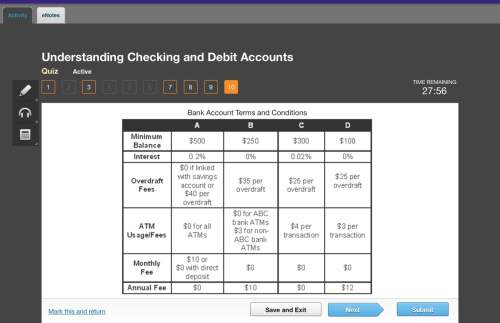
While jon is walking to school one morning, a helicopter flying overhead drops a $100 bill. not knowing how to return it, jon keeps the money and deposits it in his bank. (no one in this economy holds currency.) lfthe bank keeps 5 percent ofits money in reserves: a. how mud'i money can the bank initially lend out? b. after this initial transaction, by how much is the money in the economy changed? q what’s the money multiplier? d how much money will eventually be created bythe banking system from jon's $100?

Answers: 3


Another question on Business


Business, 21.06.2019 20:20
Aproduction order quantity problem has a daily demand rate = 10 and a daily production rate = 50. the production order quantity for this problem is approximately 612 units. what is the average inventory for this problem?
Answers: 1

Business, 22.06.2019 00:00
Which statement is true of both presidential and parliamentary systems of government? a. the executive branch operates independently from the legislative branch. b. the members of the legislative branch are directly elected by the people. c. the head of government is chosen by members of his or her political party. d. the head of government is directly elected by the people
Answers: 1

Business, 22.06.2019 03:00
Insurance companies have internal controls in place to protect assets, monitor the accuracy of accounting records and encourage operational efficiencies and adherence to policies. these internal controls are generally of two types: administrative controls and accounting controls. administrative controls are the policies and procedures that guide the daily actions of employees. accounting controls are the policies and procedures that delineate authorizations of financial transactions that are done, safeguard assets, and provide reports on the company’s financial status in a reliable and timely manner. internal controls should include both preventative and detective controls. the purpose of preventative controls is to stop problems and errors before they occur. detective controls identify problems after they have occurred. preventative controls are usually more effective at reducing problems, but they also tend to be more expensive. internal controls must be flexible to adjust for changes in laws and regulations in addition to adding new products or modifying current ones. companies must also do regular analyses to ensure that the benefits of implementing the controls are worth their costs. when concerned about paying unwarranted insurance claims which type of control would be useful?
Answers: 2
You know the right answer?
While jon is walking to school one morning, a helicopter flying overhead drops a $100 bill. not know...
Questions

English, 27.02.2020 15:49

Biology, 27.02.2020 15:50

Engineering, 27.02.2020 15:50

Mathematics, 27.02.2020 15:51


Physics, 27.02.2020 15:52



English, 27.02.2020 15:53



Mathematics, 27.02.2020 15:53

Biology, 27.02.2020 15:53

Mathematics, 27.02.2020 15:53




History, 27.02.2020 15:54

English, 27.02.2020 15:55




